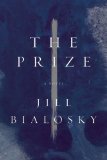Summary | Excerpt | Reviews | Beyond the Book | Readalikes | Genres & Themes | Author Bio

Critics' Opinion:
Readers' Opinion:
First Published:
Sep 2015, 325 pages
Paperback:
Aug 2016, 325 pages
 Book Reviewed by:
Book Reviewed by:
Kate Braithwaite
Buy This Book
Prologue
Edward Darby knew that an artist's work had the power to change the way in which art was perceived, for every successful artist must recreate the medium, but he did not know, each time he went to a new artist's studio, if he'd ever find it. When you see a work of art, it will be as if everything else in relationship to it has faded. Art should transport the seer from the ordinary to the sublime. His father, a scholar of Romantic poetry, told him this when he was a boy. But it was more than that. It was the myths artists created about their work that gave it clout, and as an art dealer, he was part of that creation. He thought about all this as he looked for Agnes Murray's name on the directory in the vestibule of a crumbling old warehouse in Bushwick. It was a cold and gray morning in April. He hoped he wasn't wasting his time.
He climbed four staircases to her studio. Out of breath, he saw her leaning against the battered door at the end of a dim hall in paint-spattered stretch pants and a moth-eaten cardigan pulled across her chest. She clutched the ends of her sweater. She was pale. Dark circles lined her eyes. She looked as if she hadn't seen another person in months. She thanked him for coming, held out her hand and brightened, remarking that she liked the work he showed.
She peered up at him, towering over her. "I heard you can see into an artist's soul."
He took her hand, red and chapped, with scratches and cuts, surprisingly tiny for a painter. Something about her earnestness touched him. A slant of light came through her window, and in the brightness she looked different than when she'd greeted him: an Irish beauty with corkscrew curls of red hair held back with a folded bandana, pea-green eyes, and light freckles peppered on the slope of her nose and upper cheekbones. She was petite but emanated stature.
He traversed the studio, stiff in his blue suit and embarrassed by the squeaking of his new Italian leather shoes. Paintings leaned against the walls and others were stacked on the floor. Paint pots, brushes, and open art books cluttered a worktable. At the farthest end of the studio stood an unmade cot, and on the windowsill, a creaky hotpot and boxes of cereal. A mini-fridge hummed. Unwashed mugs with dried tea bags strung around their handles stood on top. The room smelled of paint, turpentine, and the slight whiff of her odor. Clearly she lived in the studio.
Agnes was a painter with one show under her belt. Leonard Horowitz, her manager who'd arranged this studio visit, warned Edward that at her first solo show at a small gallery on the Bowery, unable to stomach the superficial chatter of the guests whom she believed had come for the party rather than for the work, and the tastemakers who, in her words, had their swords out, Agnes spent the opening in the back room nervously chipping her blue fingernail polish. She was high strung and high maintenance, an explosive combination, Leonard mocked, half serious.
The first painting she revealed was Two Boys Holding Hands. She threw off a white sheet and beamed. The canvas depicted two boys searching in the rubble of 9/11, the eerie ghost remains of the towers behind them. Wearing pantaloons and a ruffled shirt, the boys looked as if they stepped out of another century. There was, of course, a sense of irony to their dress, to Agnes's clear reference to the great Dutch portrait artists of seventeenth century, but there was also a solemnity to their expression that cut through that irony, transcended it. Their beautiful and tender faces reminded him of Vermeer's portraits. Though Agnes had painted a vast, sprawling scene, a history painting more in the vein of Rembrandt's Night Watch, the faces themselves had an intimacy and quietude that reminded him of Vermeer's portraits of women. Since he was a student, Edward had been drawn to the old master. He liked that Vermeer didn't try to impose on the world by painting grand scenes. He tried to describe the world as it was in moments of solitude and quiet domesticity.
Excerpted from The Prize by Jill Bialosky. Copyright © 2015 by Jill Bialosky. Excerpted by permission of Counterpoint Press. All rights reserved. No part of this excerpt may be reproduced or reprinted without permission in writing from the publisher.





The House on Biscayne Bay
by Chanel Cleeton
As death stalks a gothic mansion in Miami, the lives of two women intertwine as the past and present collide.

The Flower Sisters
by Michelle Collins Anderson
From the new Fannie Flagg of the Ozarks, a richly-woven story of family, forgiveness, and reinvention.

The Funeral Cryer by Wenyan Lu
Debut novelist Wenyan Lu brings us this witty yet profound story about one woman's midlife reawakening in contemporary rural China.
Your guide toexceptional books
BookBrowse seeks out and recommends the best in contemporary fiction and nonfiction—books that not only engage and entertain but also deepen our understanding of ourselves and the world around us.